The X-Factor, Reality TV, and Live Surgery Demonstration
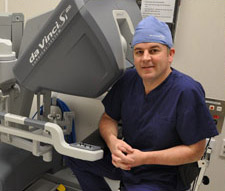 My first suggestion to my wife was that I enter Pop Idol with my modified, radiation-bashing rendition of American Pie (chorus “bye bye brachytherapy seeds“). She quickly retorted “DIVORCE! YOU CANT SING!” I begrudgingly agreed. Then Britain’s Got Talent came along and I saw an overweight Greek father and son duo, Stavros Flatley, prance around the stage bare-chested, dancing to some traditional Greek music and I thought “YES! There is hope!” I put on Riverdance, grabbed my then three-year-old son and started teaching him the basics of an Irish jig. I pleaded with my wife to allow us enter the X Factor (or whatever reality TV show was auditioning at that time), but she again screamed “DIVORCE!”. It appeared my hopes of finding fame on reality TV were dashed forever (although I expect Masterchef might be interested in my prowess on the BBQ – Murphy’s Marvellous Marinade on a whole eye fillet deserves a wider audience).
My first suggestion to my wife was that I enter Pop Idol with my modified, radiation-bashing rendition of American Pie (chorus “bye bye brachytherapy seeds“). She quickly retorted “DIVORCE! YOU CANT SING!” I begrudgingly agreed. Then Britain’s Got Talent came along and I saw an overweight Greek father and son duo, Stavros Flatley, prance around the stage bare-chested, dancing to some traditional Greek music and I thought “YES! There is hope!” I put on Riverdance, grabbed my then three-year-old son and started teaching him the basics of an Irish jig. I pleaded with my wife to allow us enter the X Factor (or whatever reality TV show was auditioning at that time), but she again screamed “DIVORCE!”. It appeared my hopes of finding fame on reality TV were dashed forever (although I expect Masterchef might be interested in my prowess on the BBQ – Murphy’s Marvellous Marinade on a whole eye fillet deserves a wider audience).
At about that time, the vogue of having live surgery demonstrations featuring at clinical meetings was really gaining momentum. The World Robotic Symposium, European Robotic Urology Symposium, European Society for Urological Technology section meeting at the EAU, Challenges in Laparoscopy & Robotics and others, were all featuring live surgery demonstrations as a prominent part of their scientific program. These sessions feature enormous high-definition screens, 3D broadcast in some circumstances, parallel operating rooms, and live interaction with the surgical team, and have proved enormously popular with audiences and sponsors alike. In fact, without live surgery, some of these meetings would be quite dull –there is certainly a commercial value in featuring live surgery as part of the program as is demonstrated by the huge numbers attending these sessions. Whether it is the lure of seeing world-famous surgeons perform robotic prostatectomy, partial nephrectomy or various types of salvage surgery, or the ever-present possibility of seeing a complication and its management, there is a blood-lust which surgical audiences have for this type of entertainment, sorry – education, and which is being met by the organisers of urology conferences. A merry band of surgeon-entertainers roam the world turning up at these conferences with their entourage of assistants and scrub nurses, and turning on the charm for the huge audiences which the big names now attract.
However, some controversy surrounds the ethics and conduct of live surgery. We wrote in the BJUI previously about some concerns we had and questioning the absolute educational value of these demonstrations. Well known leaders such as Dr Arthur Smith have also voiced concerns about live surgery and in some specialties and some countries, live surgery demonstrations are banned. In response, it has been encouraging to see the European Robotic Urology Society (now an official Section of the EAU), whose annual meeting is a live surgery spectacular, work with others to generate guidelines and ethical standards for the conduct of live surgery at scientific meetings. These will be published in the coming months.
So when it dawned on me that the personal price to pay for fame on reality TV was too high, I resigned myself to a life away from the glamour and fame of reality TV. However, I was very interested when Alex Mottrie and Ben Challacombe invited me to do a live robotic radical prostatectomy for the European Robotic Urology Symposium in London a few months ago. I had only ever done live surgery demonstrations for quite small audiences previously (I had done my karaoke version of American Pie to bigger audiences), and I was somewhat daunted and excited by the prospect of doing live surgery for a big audience, especially one full of the “Gods of Robotic Surgery”. The reality TV star inside me was saying ‘YES! I AM GOING TO BE A STAR!!” So I said yes. And the nerves started soon after. By the time it got to the opening morning of ERUS (in stunning post-Olympics London), I was pretty anxious. The case was straight-forward and I had done hundreds already, so why was I nervous? Well the audience was big (>800), and they looked blood-thirsty – I could feel them licking their lips at the prospect of something going badly wrong. I knew that a few of the “good luck mate” wishes that I had received that morning could be interpreted as “I hope you don’t hurt your head when you fall off your pedestal”. And the big guys were all over the place. The live surgery roll included Vip Patel, Richard Gaston, Alex Mottrie, Prokar Dasgupta, James Porter, Ronney Abaza, Mike Stiefleman, Ashok Hemal and Peter Wiklund. Francesco Montorsi was in the operating room next door and we would be operating in parallel. It was somewhat daunting. Even the stars looked nervous before going live with their surgery, some were even quite temperamental as the stress builds, but when they go live to the convention centre, they put on their “TV-face” and the show begins – all sweetness and charm. Quite a show.
In the “Green Room” before live surgery at Guy’s Hospital in London for ERUS 2012: Ken Palmer, Geoff Coughlin, Jim Porter, Vip Patel, Declan Murphy, Francesco Montorsi and Declan Cahill
For me, I figured out that the reason I was nervous was that I did not want to make a mess of it in front of a big audience. Human nature has a vain streak to it, and much as I am embarrassed to admit it, I realised that some of my anxiety was just that – I wanted to look and sound good on the big screens. There – I’ve said it! Something certainly added a different stress to the normal pressure of wanting to do an excellent job for your patient, and I expect that even the highly experienced live surgery stars who feature at these meetings do feel this extra pressure. Especially when things get a little sticky or you cause some bleeding and someone at the other end is asking “why did you do that?” Thankfully my case went nicely and my patient has done very well – details to be presented at next year’s ERUS as part of their new guidelines which will see feedback from all cases from the previous Symposium – an excellent initiative.
Doing robotic radical prostatectomy at ERUS 2012
So for now, the reality TV star in me has been sated and life goes on. Although I did hear there may be a new reality TV series in Australia for amateurs who fancy themselves as crocodile hunters. I wonder would she let me do that….
Declan Murphy
@declangmurphy
Declan Murphy is Honorary Clinical Associate Professor at the Department of Surgery, University of Melbourne, St Vincent’s Hospital and Director of Robotic Surgery at the Peter MacCallum Cancer Centre. He had previously been consultant urological surgeon at Guys & St Thomas’ NHS Foundation Trust in London.
Comments on this blog are now closed.

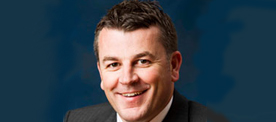
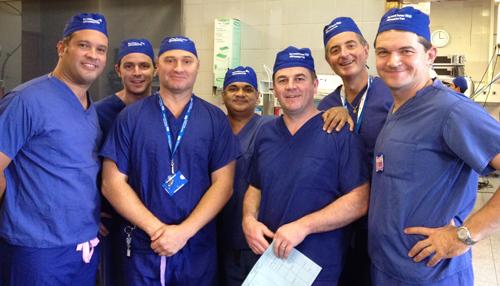
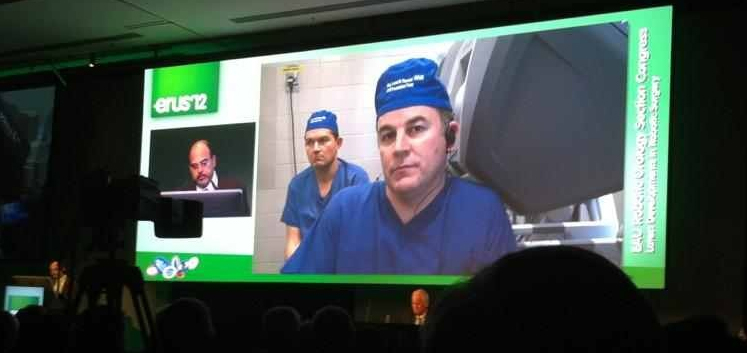
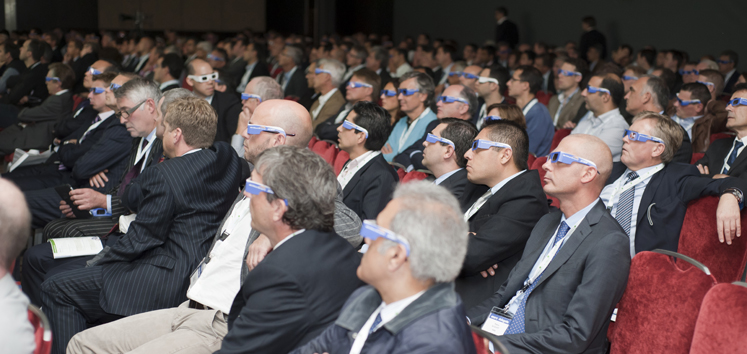
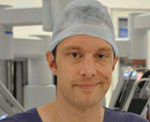

I have heard the “Radiotherapy song” first hand … and I can vouch for Declan’s singing ability! As you would expect a good balanced argument though for the use of brachytherapy! On a serious note, the whole issue of live surgery is certainly very topical and one that we have discussed at the BAUS Section of Endourology committee meetings. There certainly do have to be very clear guidelines in place and the use of a patient advocate in theatre has been very successful and I believe was useful during the ERUS conference as well. However it mustn’t be viewed as a spectator sport with a crowd baying for blood but a controlled environment where the surgeon feels comfortable and is able to end the live feed or if needed have it ended by others. Responsibility also falls on the home department to be supportive in theatre and importantly organise cases that are technically reasonable. Surgery can be stressful in any circumstance and so live cases should be within the ‘comfort zone’ of the operating surgeon. They should also not deviate from there usual procedure.
The question we should maybe ask is would you be happy to be operated on by a visiting surgeon operating with a live audience ?
Nice blog and a hotly debated topic in various meetings. I was at ERUS watching this live surgery and have to compliment the way RALP was performed by Declan. There was no hint of any nervousness and what we in the audience witnessed was good surgery.
We saw the previous blog by James Duthie regarding Superstition and Surgery (surgeons) https://www.bjuinternational.com/bjui-blog/superstition-3/ Did you follow any superstitious ritual before the Live Surgery Demonstration?!
Thanks Amrith. No suspicious behaviour to admit to on this occasion! I had been a trainee and consultant at Guy’s so I felt very at home back in the old OR. That removed one of the undoubted stresses of doing live surgery – operating in an unfamiliar OR. Also, ERUS now mandate that a Patient Advocate (usually a senior clinician), be present in the OR during all live surgery cases. Their sole purpose is to ensure that the patient’s best interests are always upheld and that the operating team are solely focussed on ensuring the best outcome for the patient. On this occasion the Patient Advocate was a senior urologist who was a mentor of mine and this helped create a comfortable, reasonably stress-free environment on the OR.
ERUS/EAU have taken the lead on creating guidelines (forthcoming) in this area and I think that these will be a new benchmark.
Dear Declan,
The article by Dr Arthur Smith “Urological live surgery – an anathema” in BJU Int was indeed an interesting read. However, his comment focussed on only one side of the coin and hence our article “A benedictory ode to urological live surgery” shows the other side of the coin. The article is now available online on the BJU Int ‘early view’ section https://onlinelibrary.wiley.com/doi/10.1111/j.1464-410X.2012.11780.x/abstract
We had to research on this topic in detail prior to the workshop at our centre in 2012, which included live surgery of a Robot-Assisted Radical Prostatectomy and Robot-Assisted Partial Nephrectomy. We had to delve even more into the intricacies surrounding the ethics of Live Surgery prior to the First live webcast from the UK of a Robot-Assisted Radical Prostatectomy in March 2012, which reached 38 countries and was watched by 550 viewers.
The initiative taken by ERUS under the auspices of EAU is to be commended upon and having a ‘outcome register’ is a major step forward in reassuring ourselves and indeed the patient groups. Several organizations have come forward with their own guidelines, including one from the AUA.
American Urological Association: https://www.auanet.org/content/aua-policies/policy-statements/l/AUA_Live_Surgery_SOP.pdf
General Medical Council: https://www.gmc-uk.org/static/documents/content/Making_and_using_visual_and_audio_recordings_of_patients_2011.pdf
Royal College of Surgeons, England: https://www.rcseng.ac.uk/publications/docs/live-surgery-broadcasts-position-statement
However, the first to come out with a concrete guidelines were the Japanese Society for Cardiovascular Surgery, the Japanese Association for Thoracic Surgery and the Japanese Society for Vascular Surgery (2007). This was following the death of patient involved in Live Surgery. There detailed guidelines can be accessed at https://jscvs.umin.ac.jp/eng/live.html Indeed, they were the first to strongly recommend that the society needs to be informed about the outcome of the surgery by quoting
“When a fixed interval has elapsed after live surgery, the surgeon must report on the postoperative course followed by the patient at an organized Society or research meeting. By this means, the body organizing such a meeting can investigate each of the cases in which live surgery has been conducted, and assesses the appropriateness of the use of live surgery in each”
As I have concluded in my article: Performing live surgery on a patient is here to stay and will be an integral part of dissemination of medical knowledge. The obligation that the medical society has towards the field of live surgery is to ensure that the operation is performed by the “right surgeon on the right patient in a right environment and with the right intentions!”
Amrith Rao